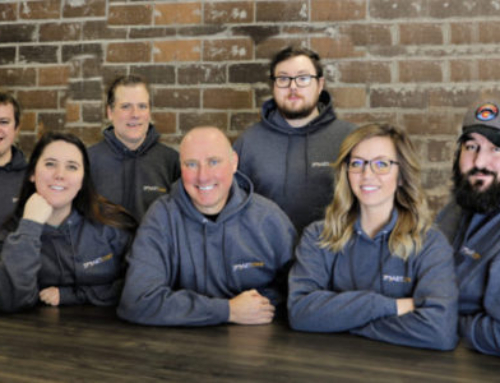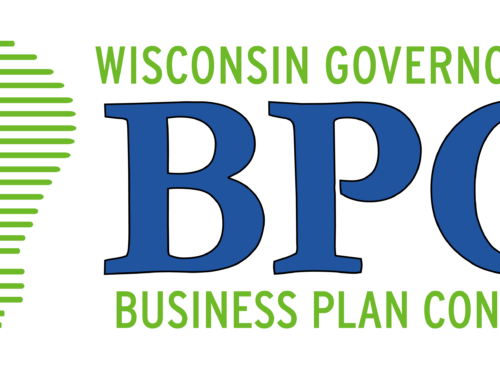
Wellntel co-founder Marian Singer pitches her company’s groundwater monitoring technology to investors at the 2018 Wisconsin Early Stage Symposium.
Marketing for the 2018 Early Stage Symposium held in Madison Nov. 7-8 billed the event as “THE place to find angel and venture capital.” True to this promise, the event’s program delivered multiple opportunities for company founders to connect with funding sources, from company pitches and “how-to” breakout sessions to a service provider expo and general networking time. The message to attendees throughout the symposium was that when it comes to raising capital for their startups, entrepreneurs need to expand their skill set.
Investors do not expect company founders to know beforehand the technicalities of venture deals. In fact, helping to educate entrepreneurs is one of the value-added services investors offer. “Our investment is only successful if the company is successful,” observed Abby Taubner, managing director of gener8tor’s gBETA accelerator program. However, angel and venture investors will expect a startup to have achieved certain milestones before they will invest in the company, and their investments come with conditions.
Craig Schedler with Northwestern Mutual Future Ventures stressed the importance of product-market fit in his company’s investment decisions. Are customers using your product, and do they like it? Taubner said she places a premium on the team behind a startup seeking capital: “For companies that don’t meet all of our criteria, we focus primarily on the team, even more so than the idea.”
A word used by multiple breakout session panelists when describing what they look for in an investment opportunity was “traction.” Traction doesn’t necessarily mean having customers or revenue; rather, it refers to where a startup founder is in his or her journey. “Do you see a path to scalability from where you are?” asked Schedler. Tauber noted that prior investment in any form can also serve as a differentiator, as it shows that others are committed to the project. Lorrie Heinemann from Madison Development Corporation said, “We like to see companies come in with a really good business plan,” and encouraged entrepreneurs to take advantage of the business development programs offered by gener8tor, the Wisconsin Women’s Business Initiative Corporation and the Wisconsin Alumni Research Foundation. Owning and controlling the intellectual property behind a product is another factor that helps draw investment.
The vetting process between investors and entrepreneurs cuts both ways, and company founders should look for the best “suite” of investors to fulfill their needs, said Mark Reinstra of Wilson Sonsini Goodrich and Rosati. Schedler agrees: “It is just as important for entrepreneurs to interview investors. What do they bring to the table?” he noted. “We pride ourselves in having a huge rolodex of expertise that may not be inherent to your organization,” added Greg Baker from Bascom Ventures.
Katie Schmitz of Ziegler cautioned, “Not all capital is good capital. Relationships and rapport are important. You are going to be together for a long time.” Entrepreneurs should ask potential investors to name similar companies they have invested in and to detail how they helped those companies reach their goals. When seeking investors, they should ask other entrepreneurs to make an introduction to their funders, but should be wary of paid “finders,” as investors see introductions from such consultants as holding less value.
Keeping potential investors involved in your fundraising process takes dedication and coordination, as it is often necessary to get multiple parties to “cross the finish line at the same time,” noted Reinstra.
Among the services entrepreneurs should expect from investors beyond capital is helping them find their next investor. Heinemann noted, “We all know each other and refer companies to each other.”
In order to get a sense of how much capital you should seek, Schmitz recommends researching what types of rounds companies similar to yours have raised at stages comparable to where you stand. Taubner adds that how much you are able to raise will be dependent upon your geography and industry. Entrepreneurs should pursue enough funding to have confidence that they will make it to their next milestone, whether that milestone be related to personnel, product development, regulatory approval or sales. Generally speaking, startup founders should plan on fundraising rounds every 12 to 18 months in the early stages of their venture and every 18 to 24 months in later stages.
Understand that with angel and venture investing, you are trading equity in your company for the opportunity to grow. Generalizing, Jackie DiMonte of Hyde Park Venture Partners said, “Plan to give up 20 to 30 percent of your company in each funding round.” Be careful, too, when raising capital through strategic partnerships, notes Reinstra, as the motivations of a strategic partner may not align with your growth objectives.
Successfully raising capital for your startup only increases the pressure on your company to perform. Taubner observed, “When you raise venture capital, it is critically important to be aware of how you are spending your time, because investors are watching.” At the same time, you should not hide any negative company news from your investors, because they will find out eventually, and the earlier they know about the challenge, the more helpful they can be.
WEDC provides information on funding sources and other resources for Wisconsin startups in the quarterly INVest newsletter. Subscribe here.









FOLLOW US